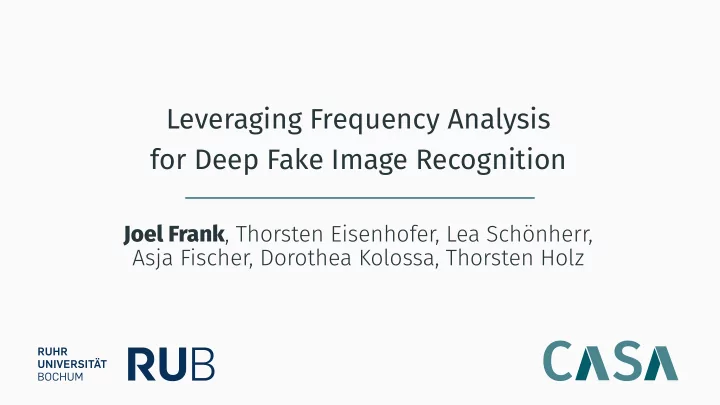

Leveraging Frequency Analysis for Deep Fake Image Recognition Joel Frank , Thorsten Eisenhofer, Lea Schönherr, Asja Fischer, Dorothea Kolossa, Thorsten Holz
Which Face is Real?
Which Face is Real?
Which Face is Real? N 1 − 1 N 2 − 1 I x , y cos [ N 1 ( x + 1 2 ) k x ] cos [ N 2 ( y + 1 2 ) k y ] . π π ∑ ∑ D k x , k y = x =0 y =0
Which Face is Real? N 1 − 1 N 2 − 1 I x , y cos [ N 1 ( x + 1 2 ) k x ] cos [ N 2 ( y + 1 2 ) k y ] . π π ∑ ∑ D k x , k y = x =0 y =0
Which Face is Real? N 1 − 1 N 2 − 1 I x , y cos [ N 1 ( x + 1 2 ) k x ] cos [ N 2 ( y + 1 2 ) k y ] . π π ∑ ∑ D k x , k y = x =0 y =0
Specific to StyleGAN?
Specific to StyleGAN? Stanford Dogs BigGAN ProGAN SN-DCGAN StyleGAN
Specific to StyleGAN? Stanford Dogs BigGAN ProGAN SN-DCGAN StyleGAN LSUN Bedrooms Nearest Neighbour Bilinear Binomial
Advantages of the Frequency Domain
Advantages of the Frequency Domain Domain Accuracy Image 75.78% Frequency 100.00%
Advantages of the Frequency Domain Domain Accuracy Image 75.78% Frequency 100.00% • Experiments on corrupted data
Advantages of the Frequency Domain Domain Accuracy Image 75.78% Frequency 100.00% • Experiments on corrupted data • Blurring, cropping, jpeg compression, noise, combination
Advantages of the Frequency Domain Domain Accuracy Image 75.78% Frequency 100.00% • Experiments on corrupted data • Blurring, cropping, jpeg compression, noise, combination • Frequency representation performs better (bar one exception)
Advantages of the Frequency Domain Domain Accuracy Image 75.78% Frequency 100.00% • Experiments on corrupted data • Blurring, cropping, jpeg compression, noise, combination • Frequency representation performs better (bar one exception) • When trained on corrupted data, frequency representation recovers higher accuracy
Frequency Domain N 1 − 1 N 2 − 1 I x , y cos [ N 1 ( x + 1 2 ) k x ] cos [ N 2 ( y + 1 2 ) k y ] . π π ∑ ∑ D k x , k y = x =0 y =0
Frequency Domain Discrete Cosine Transform
Frequency Domain
Frequency Domain N 1 − 1 N 2 − 1 I x , y cos [ N 1 ( x + 1 2 ) k x ] cos [ N 2 ( y + 1 2 ) k y ] . π π ∑ ∑ D k x , k y = x =0 y =0
Frequency Domain N 1 − 1 N 2 − 1 I x , y cos [ N 1 ( x + 1 2 ) k x ] cos [ N 2 ( y + 1 2 ) k y ] . π π ∑ ∑ D k x , k y = x =0 y =0
Frequency Domain N 1 − 1 N 2 − 1 I x , y cos [ N 1 ( x + 1 2 ) k x ] cos [ N 2 ( y + 1 2 ) k y ] . π π ∑ ∑ D k x , k y = x =0 y =0
Frequency Domain Frequencies in x direction Frequencies in y direction N 1 − 1 N 2 − 1 I x , y cos [ N 1 ( x + 1 2 ) k x ] cos [ N 2 ( y + 1 2 ) k y ] . π π ∑ ∑ D k x , k y = x =0 y =0
Specific to StyleGAN? Stanford dogs BigGAN ProGAN SN-DCGAN StyleGAN
Specific to GANs? Cascaded Refinement Networks Implicit Maximum Likelihood Estimation Wang, et al., "CNN-generated images are surprisingly easy to spot... for now", CVPR 2020
Upsampling? Latent 4x4 8x8 16x16 32x32 64x64 ... 1024x1024
Upsampling? Odena, et al., "Deconvolution and Checkerboard Artifacts", Distill 2016 Latent 4x4 8x8 16x16 32x32 64x64 ... 1024x1024
Upsampling? Odena, et al., "Deconvolution and Checkerboard Artifacts", Distill 2016 Latent 4x4 8x8 16x16 32x32 64x64 ... Strided Transposed Convolution → Upsampling + Convolution 1024x1024
Upsampling? Odena, et al., "Deconvolution and Checkerboard Artifacts", Distill 2016 Latent 4x4 8x8 16x16 32x32 64x64 ... Strided Transposed Convolution → Upsampling + Convolution 1024x1024 Durall, et al., "Watch your Up-Convolution: CNN Based Generative Deep Neural Networks are Failing to Reproduce Spectral Distributions", CVPR 2020
Advantages of the Frequency Domain Domain Accuracy Image 75.78% Frequency 100.00%
Advantages of the Frequency Domain • Frequency domain enables linear separability
Advantages of the Frequency Domain Nearest Neighbour Bilinear Binomial
Advantages of the Frequency Domain • Frequency domain enables linear separability • Still artifacts for more elaborate upsampling techniques
Advantages of the Frequency Domain • Frequency domain enables linear separability • Still artifacts for more elaborate upsampling techniques • For existing source attribution tasks, we can reduce the error rate by up to 75%
Advantages of the Frequency Domain • Frequency domain enables linear separability • Still artifacts for more elaborate upsampling techniques • For existing source attribution tasks, we can reduce the error rate by up to 75% • Neural network training is easier and needs less training data
Advantages of the Frequency Domain • Frequency domain enables linear separability • Still artifacts for more elaborate upsampling techniques • For existing source attribution tasks, we can reduce the error rate by up to 75% • Neural network training is easier and needs less training data • Experiments on corrupted data
Recommend
More recommend